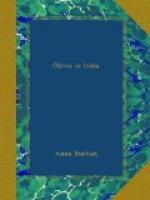There are two Royle children—Kittiwake and Hilda. Kittiwake (christened, I believe, Kathleen Helen) is fat and broad and beaming, and very religious. Hilda is inclined to love the gay world, and finds Rika too quiet—the baby aged six! They are both thorough little sportsmen and mounted on their ponies go with their father almost everywhere. Yesterday I went for a ride with them, along dusty brown roads between rice-fields, and they gave me a wonderful lot of information about the place and the people. As we passed a little village temple Kittiwake stopped. “That,” she said solemnly, pointing with her whip, “is where they worship false gods.”
I told Mr. Royle about Peter being so anxious for a mongoose, and to-day when the children came running to beg me to come quickly and see what the fisherman had caught for me, my mind leapt at once to mongooses. When I saw, confined under a wicker basket, two animals with yellow fur and flat heads that moved ceaselessly, my heart sank. If they had been caught for me how could I be so ungracious as to refuse them, and yet how was it possible for me to carry these most terrifying creatures about with me, and perhaps, on the voyage home, have to share my cabin with them?
I looked round wildly. The fisherman was grinning delightedly at his own cleverness. Our two chuprassis, Autolycus, and a syce stood round with the children, all waiting for my approval.
“They’re rather nice, aren’t they?” I stammered feebly.
“Oh—sweet!” said Hilda rapturously.
“Sweet!” I echoed. “But aren’t they big ones?”
“Big!” cried Kittiwake. “Why, they’re only butchas;” and she lifted the edge of the basket to get a better view, at which one of the butchas made a rush for the opening and made straight at me. With a yell I snatched up my skirts, knocked over Hilda, leapt “like a haarse” on to the verandah straight into the astonished Mr. Royle, while the weird beast disappeared like a yellow streak.
“Whatever is the matter?” he asked as I sank to the floor.
“Olivia’s afraid of the butcha otter!” squealed Hilda, while she scampered about looking for the truant.
“Otter?” said I.
“Yes,” said Mr. Royle; “they are baby otters that the fisherman found at the side of the lake. I thought of sending them to the Calcutta Zoo. They aren’t very common in India.”
“I’m so glad!” I gasped; and Mr. Royle looked mystified. It didn’t seem exactly a reason for fervent gladness, but suppose they had been mongooses? My life, so to speak, was ruined.
Staying in the house with Mr. Royle is rather like being with Colonel Newcome in the flesh. He is such a very “perfect gentil Knight”—as courteous to a native woman as to the L.-G.’s wife. The people round about adore him and his wife; they are a kind of father and mother to the whole district. There would be little heard of disloyalty to the British if all the Sahibs were like Mr. Royle, He is so good—I’d be almost afraid to be so good in case I died—but not the least in a sickly way. He is a teetotaller, a thing almost unheard of in India; and he isn’t ashamed to be heard singing hymns with the children before their bed-time; yet (why yet?) he is a crack shot, a fine polo player, an all-round sportsman.




